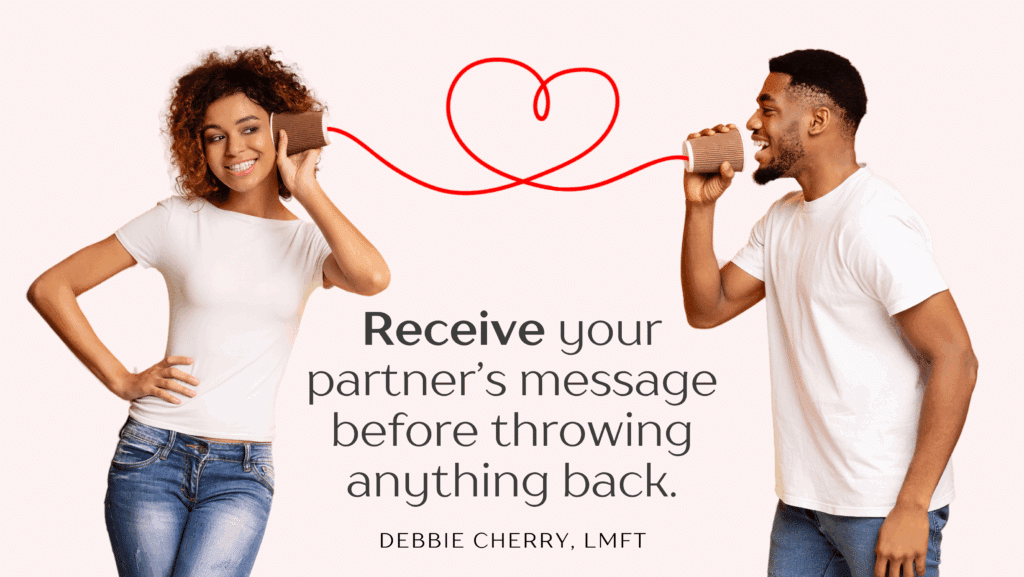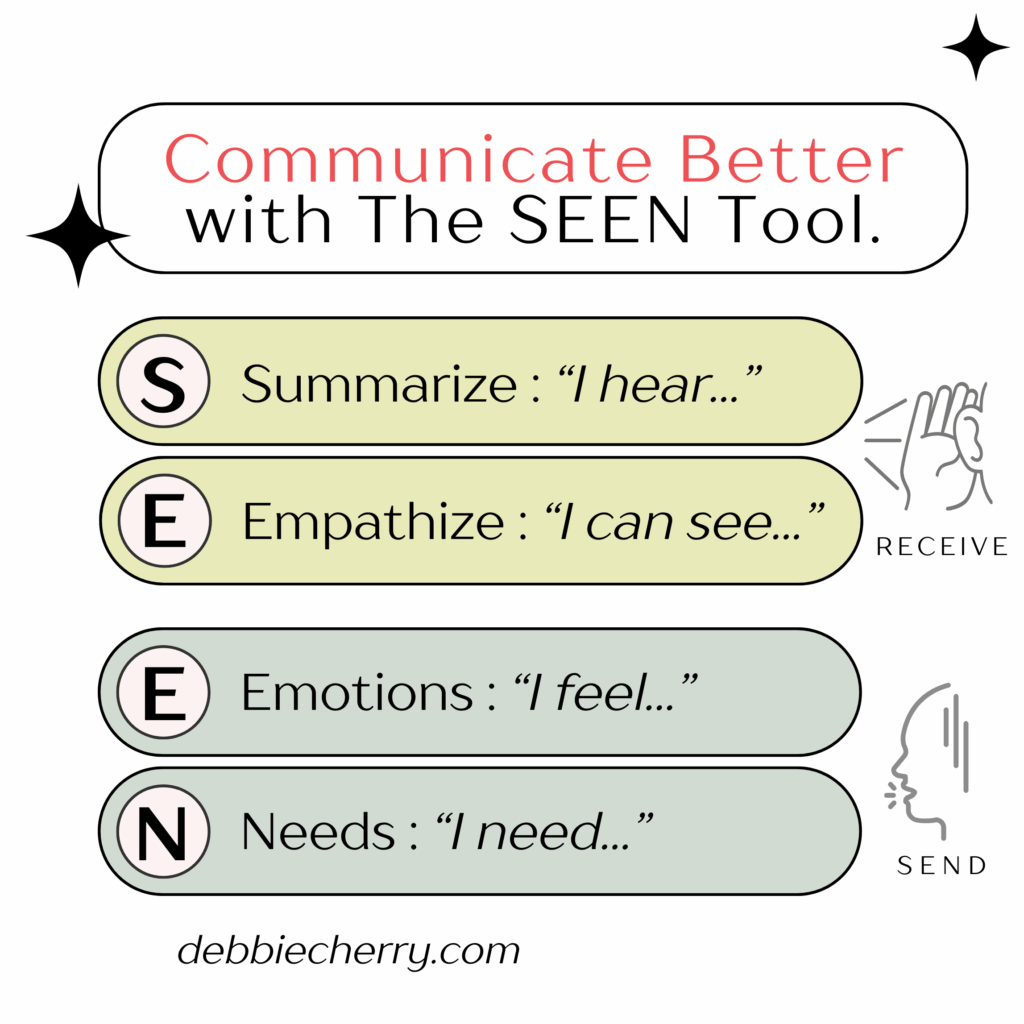You used to talk for hours…
It felt like you got each other better than anyone.
Now, you keep having the SAME arguments over and over. Everyday things like dishes, missed texts, or weekend plans can lead to stress, hurt feelings, or long stretches of silence.
The more you push to be heard, the more disconnected you both feel.
It becomes a painful loop.
Why Couples Communication Breaks Down.
Feeling unheard by the person who is supposed to get you the most is deeply troubling. Your nervous system kicks into overdrive, and effective communication goes out the window.
Instead of hearing your partner, you’re caught in a whirlwind of assumptions and automatic defenses. Your brain processes thoughts 10x faster than your partner can talk. Disconnection triggers a fight-or-flight response.
It’s nearly impossible to access empathy or compassionate communication in survival mode. You shut down or lash out. You become opponents, rather than partners.

Interrupt The PATTERN with Reflective Listening.
Before explaining yourself, defending your actions, or trying to solve the problem, pause… and REPEAT back what your partner is saying. Treat conversations like you’re throwing a ball back and forth.
Receive what your partner says before sending anything back. Don’t rush to counter their points. Take a deep breath and change the defensive patterns pushing you apart.
Instead of letting your mind run with old stories like “Here we go again” or “That’s not true,” pause.
Slow down and SUMMARIZE what you hear.
Think of Couples Communication Like Playing Catch.
Receive the message before tossing something back. Stop playing dodge ball… start playing emotional catch.
Here Is Exactly What To Say, So You Both Feel Heard.
First = CONNECT before you correct, criticize or defend.
- “I hear…” (Reflect their words)
- “I can see…” (Acknowledge their feelings)
Then = SPEAK in a way your partner can hear you.
- “I feel…” (Name your own experience)
- “I need…” (Share a specific desire)

Break Free From Negative Cycles.
Just the other day my husband and I almost went down a disconnection spiral. He asked me to help him move furniture back into my office after putting in hardwood floors and an acoustic wall.
I was just sitting down to write this very first blog that I’ve been waiting years to begin. My mind quickly flooded with super unhelpful thoughts like… “I never get what I need.” and “he is so bad at planning things out”.
I was able to catch myself. I summarized & empathized before I reacted. I said, “I hear that you really need help right now moving the stuff back. I can see why that’s important to you because your back hurts and your mom is coming in town.” Actively listening gave me enough time to see his perspective, rather than get stuck in my own.
A fight only starts when you’re not on the same team.
If you want to communicate effectively, you have to CONNECT first.
The reflexive nature of defensive reactions makes them extremely hard to change. That’s why I created the SEEN tool for couples to remember how to communicate better with simple steps that are easy to remember… (even when you’re upset).
TRANSFORM COUPLES COMMUNICATION WITH THE SEEN TOOL.
After 20 years of working with couples, I’ve seen how these simple, research-based skills can shift communication from defensive to connected. Use them to stay close, even when things get hard.
S —> Summarize.
Put your brain in neutral. Reflect what your partner said in your own words before adding anything.
“I HEAR that it felt like I was ignoring you last night.”
This act of active listening helps your partner feel safe enough to soften and truly listen in return.
E —> Empathize.
Validate their emotional experience. Even if you don’t agree with the facts, connect with their feelings.
“I CAN SEE how that felt hurtful or overwhelming.”
This helps your partner feel seen, rather than judged.
E —> Express Emotions.
Use “I” statements to share your own feelings without blame.
“I FEEL hurt when we don’t connect before bed.”
This keeps the conversation grounded in deeper level feelings, not accusations.
N —> Name Needs.
State what you need in a way that invites support, not defense.
“I NEED a few minutes to reconnect before we jump into the evening routine.”
Sharing specific needs opens up a safe space for meaningful conversations, rather than power struggles.
📲 SCREENSHOT TO PRACTICE!

Build a Healthier Relationship with ONE Small Shift…
Summarize before you defend.
Actively LISTEN in the first 3 minutes of your conversations because that’s when it matters most. Research by Dr. John Gottman shows that those first three minutes predict the direction of the conversation with 90% accuracy.
So, just keep it together for at least three minutes!
💞 Try This 15-Minute Emotional Catch Couples Game…
Emotional Catch is a playful, powerful way to pause and reconnect with your partner. This practice helps you play verbal catch instead of ping-pong arguments, building a habit of curiosity over criticism.
HOW TO PLAY EMOTIONAL CATCH:
- Choose a word from the curated list, or make up your own.
- Take turns sharing what that word brings up for you… thoughts, feelings, needs.
- One partner shares for 5 minutes while the other actively listens… summarizing and empathizing with what they hear.
- Then switch. In the final 5 minutes, reflect together on what you learned about each other.
—> Catch-The-Feeling Words:
-
- Curious
- Schedules
- Vision
- Consistency
- Authenticity
- Touch
- Silence
- Secure
- Phones
- Partners
Effective Communication Starts with Feeling UNDERSTOOD.
You don’t have to figure out who’s right or unpack every trigger to improve communication.
You just have to let your partner know: You’re not alone in this.
That’s what good communication skills are really about.
CATCH their words before tossing yours back.
When your heart’s racing and your mind is ready to react, pause.
Receive: Summarize and empathize first.
Then, Send: Express emotions and state clear needs.
The next thing you know, you’re plotting a date night, not sulking in separate rooms.
Reflect before you react.
keep connecting,
Debbie Cherry, LMFT
FREE COUPLES COMMUNICATION TOOLKIT: Get practical tools and simple steps to improve couples communication in just a few minutes a day.
💝 Grab the Connected Communication Toolkit here.
—> Want expert support for your relationship?
📅 Schedule An Appointment:
debbiecherry.com/book
Relationship Resources & References:
- Attachment Styles & Communication : Research shows that attachment influences how difficult messages are delivered and received—affecting conflict escalation or resolution.
- Gottman Couples Conflict Research (Carrère & Gottman, 1999)
Source of the “first three minutes predicts 90% of the outcome” research study. - Hendrix, H., & Hunt, H. (2007). Getting the Love You Want: A Guide for Couples.
Introduces Imago Relationship Therapy, including the Imago Dialogue… a structured way for couples to mirror, validate, and empathize to restore connection - International Listening Association
https://listen.org/Listening-Facts
Cited for statistics about the brain thinking 10x faster than it listens (average listening rate of 125-250 WPM vs. 1,000–3,000 WPM thinking speed). - Official Center for Nonviolent Communication (CNVC): Invites you to speak from your feelings and needs rather than blame or judgment.
https://www.cnvc.org
💬 Frequently Asked Questions About Relationship Communication:
What’s reflective listening and why is it so effective?
Reflective listening is the practice of repeating back what your partner says before adding your own response. It helps you stay out of defensive mode, allows your partner to feel heard, and sets the stage for emotional intimacy in a supportive environment. It’s like putting your brain in neutral before responding… a simple but powerful way to support a healthy relationship through effective communication. It also helps you read nonverbal cues like facial expressions, body language, and reflect your partner’s perspective through their eyes, not just your own. It’s one of the most effective communication exercises for building clear communication in intimate relationships.
What’s the first thing I should do in a difficult conversation?
Pause and summarize what you hear your partner saying. Before defending or problem-solving, reflect their words. Slowing down and summarizing first helps you stay present, regulate your nervous system, and shift out of fight-or-flight mode… a crucial step in resolving communication issues with clarity. It’s a great active listening exercise in attention and compassion, and helps you stay more connected to the other’s feelings. This one step alone can shift the tone of the entire conversation, helping both of you feel more connected and back on the same page. It also fosters clear communication and shows respect for your partner’s perspective, which strengthens trust.
How does couples therapy help communication skills in relationships?
Therapy offers practical wisdom and helpful tips drawn from years of experience and research. Modalities like Imago Relationship Therapy create a safe space for deeper emotional intimacy and healing power through connection. A couples therapist can help both partners learn to actively listen, express feelings constructively, and resolve misunderstandings without blame. Positive language exercises can help create deeper understanding of each other’s needs. Marriage counseling teaches communication skills and provides custom communication exercises like reflective listening, eye contact and assertive communication using positive statements.
How can I help my partner feel heard?
Use reflective listening to show you care about your partner’s point of view, thoughts and feelings without judgment. Pay attention to non verbal cues like tone, eye contact, and posture. When we feel threatened, in a bad mood, or misunderstood, our ability to reflect, empathize, and respond kindly shuts down. Sometimes, taking a time out to reset emotionally can help you come back with a clearer, calmer mindset, especially in moments of poor communication between one partner and the other. Try to see the situation through your partner’s perspective, and respond from the other’s perspective, not just your own. These small shifts reduce relationship issues, help couples communicate effectively and strengthen your emotional bond.

